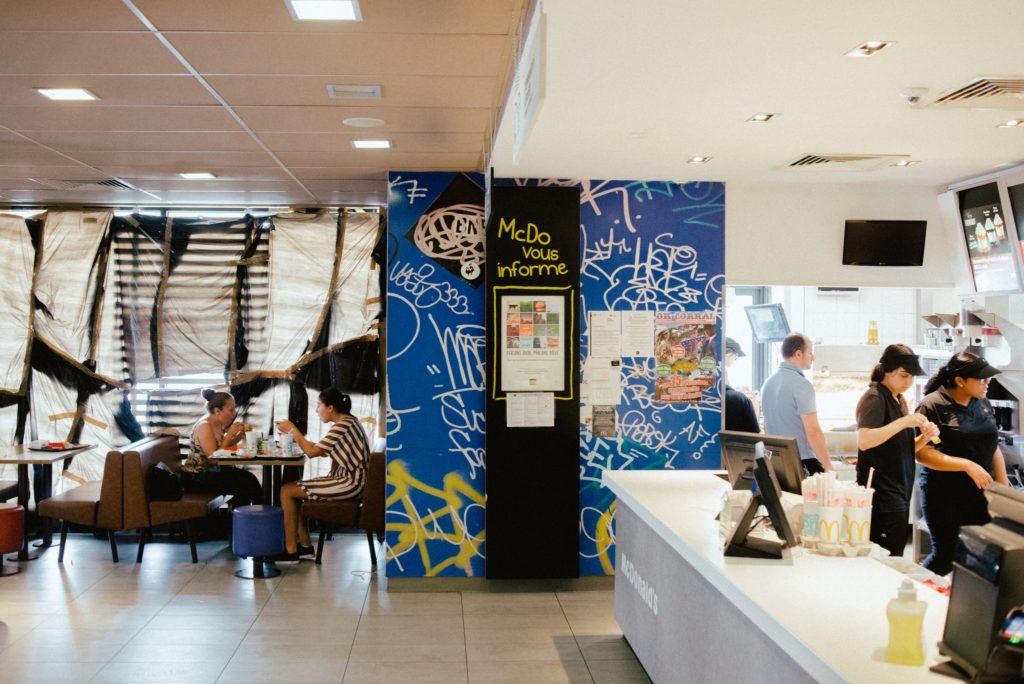
The popular view of French food veers toward the gourmet side – fine wines, superb cheeses, elegant sauces, local specialties – enjoyed at a leisurely pace, with rich social interactions. One of the delights of being in France is the high quality of dining at neighborhood bistros and cafes, with a surprising variety of dishes on offer. In other words: the opposite of American fast food, epitomized by McDonald’s, with its uniform, mass-produced food, designed to be consumed quickly, often on the go.
France has its own fast-food traditions and street food, including croque-messieurs, crepes, and baguette sandwiches. But those foods seem more sophisticated and in tune with French culture than what you get at Mickey D’s. No surprise that McDonald’s has a checkered history in France, with its first restaurant in Paris in 1971 closing soon after opening. Over the years, as more McDonald’s franchises have opened throughout France, the company has experienced more success, but also continued resistance – not only to its non-French approach to food preparation and consumption, but also because for the French the company represents globalization, Americanization, and unfair trade and labor practices. In 1999 a group of protesters led by farmer José Bové destroyed a half-built McDonald’s restaurant in Millau.
So why is there a passionate campaign in Marseille to keep a McDonald’s threatened with closure? It’s not the food, it’s the community role that particular restaurant plays, according to the New York Times:
A group of workers and their union leaders in Marseille are fighting tooth-and-nail to save a McDonald’s from closing in a working-class, largely immigrant neighborhood. A so-called “Festival of Dignity” protest was recently organized by the McDonald’s employees in an effort to save their roughly 70 jobs. Even though McDonald’s was once seen as a cultural menace to a glorious French tradition, the workers say this particular McDonald’s, in its quarter-century of existence, has played a vital role as a social integrator in one of France’s most troubled districts — providing employment and shielding local youth from pervasive drug-dealing, getting them out of jail and helping them stay out.
The article chronicles a number of personal stories of neighborhood youth, all from economically disadvantaged families with migrant backgrounds, who were hired by the McDonalds, giving them an initial foothold in life and keeping them off the streets and out of trouble. That has been particularly important for Muslim youth, often facing employment discrimination. The restaurant is the second largest employer in that part of Marseille.
Ironically, the current owners of the McDonald’s want to sell the restaurant to a Muslim halal food operator who wants to open a new restaurant serving Middle Eastern food. The reaction of McDonald’s employees to that plan, most of them Muslims, as reported in the NY Times has been anger: “’This is an insult. We’re fighting for laïcité here,’ said Salim Grabsi, a local schoolteacher and former employee, referring to France’s official credo of secularism. ‘The republic is one and indivisible’.” That perspective seems to echo the reaction from France decrying some comments on the African origins of the families of many French players on the French national soccer (football) team’s which won the World Cup in 2018 (for example, Trevor Noah’s “Africa wins the world cup!”). The point made was that in France, everyone is “French”, no matter their heritage (i.e., no hyphenated identity descriptors, as in the US).
Here’s another irony of the Marseille McDonald’s story: There was a controversy in Marseille in 2017 on a city government crackdown on street vendors of kebabs. Given that the owners of those establishments are overwhelmingly North Africans, most of them Muslim, this action was decried as “gastronomic racism”. As far as the closure of the McDonald’s is concerned, a French court for now has blocked the sale of the outlet – so that location will for now continue to offer the “Royale with Cheese” (McD’s quarter-pounders; see Pulp Fiction), not kebabs.